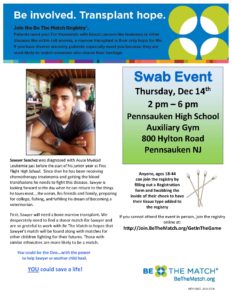Bone Marrow Donor Match Drive Held At PHS On December 14
A donor match drive to help battle life-threatening blood cancers and other diseases will be held on Thursday, Dec. 14, 2:00 to 6:00 p.m. at Pennsauken High School, 800 Hylton Rd.
 For thousands with blood cancers like leukemia or other diseases, like sickle cell anemia, a bone marrow transplant is their only hope for life. If individuals have a diverse ancestry, patients especially need them, as these donors are most likely to match someone who shares their heritage.
For thousands with blood cancers like leukemia or other diseases, like sickle cell anemia, a bone marrow transplant is their only hope for life. If individuals have a diverse ancestry, patients especially need them, as these donors are most likely to match someone who shares their heritage.
Match donors are identified through a simple cheek swab procedure. Statistics indicate that a majority of individuals suffering from blood cancer – 70 percent – do not have a blood or bone marrow match with a family member and therefore require a non-family member to donate. And according to the National Bone Marrow Program, there are 14,000 patients per year whose only hope for a cure is a transplant from someone outside their family.
“We encourage our residents to take the time to be considered as a donor,” says Township Committeeman Rick Taylor. “The process is simple; and while there’s no obligation to be a donor, doing so can be life saving.”
Anyone between the ages of 18 to 44 can join the registry. If an individual is called as a potential match for a patient in need, making a commitment as a donor means that this person is willing to take up to 20-30 hours, spread over four to six weeks, to attend an information session, attend appointments, and make a bone marrow donation.
If an individual matches a patient in need, there are two ways to donate. The patient’s doctor chooses the donation method that is best for the patient. Peripheral blood stem cell (PBSC) donation is a non-surgical, outpatient procedure called apheresis. The donor receives a drug for five days prior to donation that increases the number of cells in the bloodstream. The cells are then collected during donation. The donor may experience head or muscle aches that disappear shortly after donation, and are typically back to their normal routine in one to two days. Marrow donation is a surgical, outpatient procedure that takes place in a hospital operating room. While the donor is under anesthesia, doctors collect marrow from the back of their pelvic bone. After donation, donors may feel soreness in the lower back. Donors are typically back to their normal routine in two to seven days.
The event is sponsored through Be The Match,® an organization operated by the National Marrow Donor Program® that helps patients find their life-saving donors and provide support throughout the transplant process. For more information, visit BeTheMatch.org.

